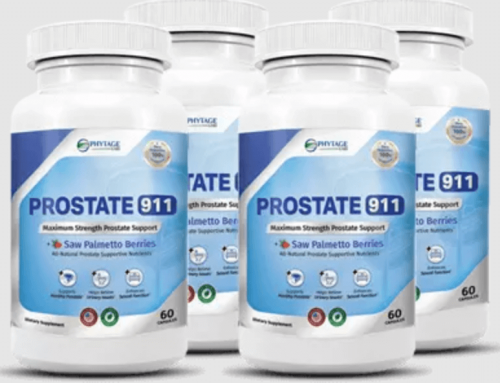For men, prostate health is of vital importance. According to the American Cancer Society, prostate cancer is the second most common form of cancer for men, following only skin cancer. While this type of cancer is often slow to develop, some forms are much more aggressive and may even prove fatal. Being aware of your prostate health and receiving regular screenings as you get older are critical steps to preventing prostate cancer.
Here at Prostate 911, we’re dedicated to helping individuals live better lives by improving their prostate health. Our supplements can help you preserve your prostate health before you ever need to consider treatment for more serious conditions. Our supplements help combat common prostate problems, such as frequent urination, painful urination, the need to get up in the middle of the night to urinate, and even lower back or pelvis pain.
To help you preserve the health of your prostate, we’re taking a look at eight top tips for improving and maintaining your prostate health. Even better: most of these tips don’t require major lifestyle changes and, in addition to improving your prostate health, will even improve your overall health, as well.
WHAT IS THE PROSTATE?
The prostate is a small gland (roughly the shape of a walnut) located in men between the penis and the bladder. The role of this small gland is to produce fluid that protects and nourishes semen. Men suffering from an enlarged or cancerous prostate may suffer urinary problems or erectile dysfunction.
REGULAR EXERCISE
What can’t exercise do for your body? One of the most effective ways at maintaining a healthy prostate is through regular exercise. Research has shown a clear connection between obesity and a greater risk for prostate cancer. Not only that, but regular exercise also reduces your risk of heart disease, manages blood sugar and insulin levels, improves mental health, and even puts you in a better mood.
Many people can’t stand going to the gym for a variety of reasons, but you don’t necessarily need to bulk up like a bodybuilder to improve your prostate health. Even low impact and moderate exercise, such as running, jogging, swimming, or even yoga, can have amazing benefits for your body and mind. Of course, it’s always advisable to consult your doctor before making any major changes to your exercise routine.
FRUITS AND VEGETABLES
Ever since we were young, most of us were told to eat our fruits and vegetables. Well, this advice is worth heeding as it may help you maintain a healthy prostate. Fruits and vegetables contain compounds that assist your body in fighting carcinogens, which cause cancer. Additionally, eating fruits and vegetables can help you stay full throughout the day and help you avoid reaching for fatty food or snacks.
If you’re someone who simply doesn’t like eating fruits and vegetables, consider investing in a blender. Fruit and vegetable smoothies are a great, and tasty, way to get your daily dose of these healthy foods.
COFFEE
For many of us, it’s a daily challenge starting your morning without at least one cup of joe. Not only does this morning routine help wake you up, but did you know it could also help prevent prostate cancer? According to a 2014 clinical review, drinking several cups of coffee each day (4 to 5) can actually decrease your chances of developing serious forms of prostate cancer.
If that sounds like too much caffeine, research has also shown that even smaller amounts of coffee can lower your risks of getting prostate cancer. But what exactly gives coffee the power to fight off prostate cancer? Two chemicals in coffee beans, cafestol and kahweol, are proven cancer inhibitors. Research also suggests that boiled coffee, compared to using a filter, is a more effective method for keeping your prostate healthy as there is no filter to trap these beneficial chemicals.
GREEN TEA
If coffee isn’t your style, green tea is another excellent drink option for preserving your prostate health. Studies have shown a link between men who drink green tea, or green tea supplements, and a lower overall risk of prostate cancer. Additionally, the benefits of drinking green tea also include improved brain function, prevention of type 2 diabetes, reduced risk of cardiovascular disease, and increased fat burning.
GET A LITTLE SUNSHINE
When out in the sun, we always want to be cautious about protecting our skin. Too much sun, as we know, not only gives you a painful sunburn, but can also lead to skin cancer after repeated exposures. However, the sun can be your friend. Sunlight is beneficial because it stimulates our bodies to produce the vitamin D we need. This vitamin regulates calcium and phosphate, supporting strong bone development, and can also reduce the risk of prostate cancer.
STOP SMOKING
In addition to numerous other health risks, smoking can also harm your prostate health. A study by the Harvard School of Public Health has shown that smoking may increase risk of prostate cancer recurrence. This same study also revealed a link between smoking and higher mortality rates for prostate cancer patients.
Smoking has several detrimental effects on your body. Beyond its impact on your prostate health, smoking can also cause other forms of cancer, increases your risk of heart attack or stroke, and elevates your chances of developing diabetes and lung disease. If you are a smoker, don’t give up hope—there are various organizations that have designed methods to help you stop smoking, including nicotine replacements and relaxation techniques.
LIMIT FATTY FOODS
In 2014, a study linked a diet high in fats with an increased risk for prostate cancer. However, it’s important to note that this study was pointing to just animal fats (those found in meat and dairy products) and not plant-based fats. To better protect your prostate, look for foods with plant-based fats the next time you’re at the grocery store. Some options include: nuts, seeds, avocados, olive oil, or even cacao nibs, which are the raw form of chocolate.
REGULAR PROSTATE SCREENINGS
One of the simplest things you can do to prevent prostate cancer is by visiting your doctor for regular screenings. Depending on your risk level, you should begin regular screenings by the time you hit your 40s or 50s. Studies have shown that African American men, those of Scandinavian heritage, and anyone with a history of prostate cancer in their family should begin screenings by 40. If you’re not in one of these high-risk groups, doctors recommend screenings by your mid-50s.
CONCLUSION – 10 TIPS FOR BETTER PROSTATE HEALTH
As you can see, there are many practical steps you can take every day to help you maintain a healthy prostate and ward off the potential for prostate cancer. Sticking to a healthy diet with lots of fruits, vegetables, and plant-based fats, quitting smoking, and getting plenty of exercise are important ways to keep not only your prostate healthy, but your entire body.
In addition to these important steps, you may also want to consider vitamins and supplements to boost your prostate health. If you’re interested in complementing a healthy diet with nutritional supplements, look into our top-selling Prostate 911 supplement that can improve your overall prostate health.
For more information on our high-quality prostate supplements, please visit our PhytAge Labs website or reach out to us on our contact page. Don’t wait until it’s too late to take care of your prostate. Act now to ensure the quality of your health.





